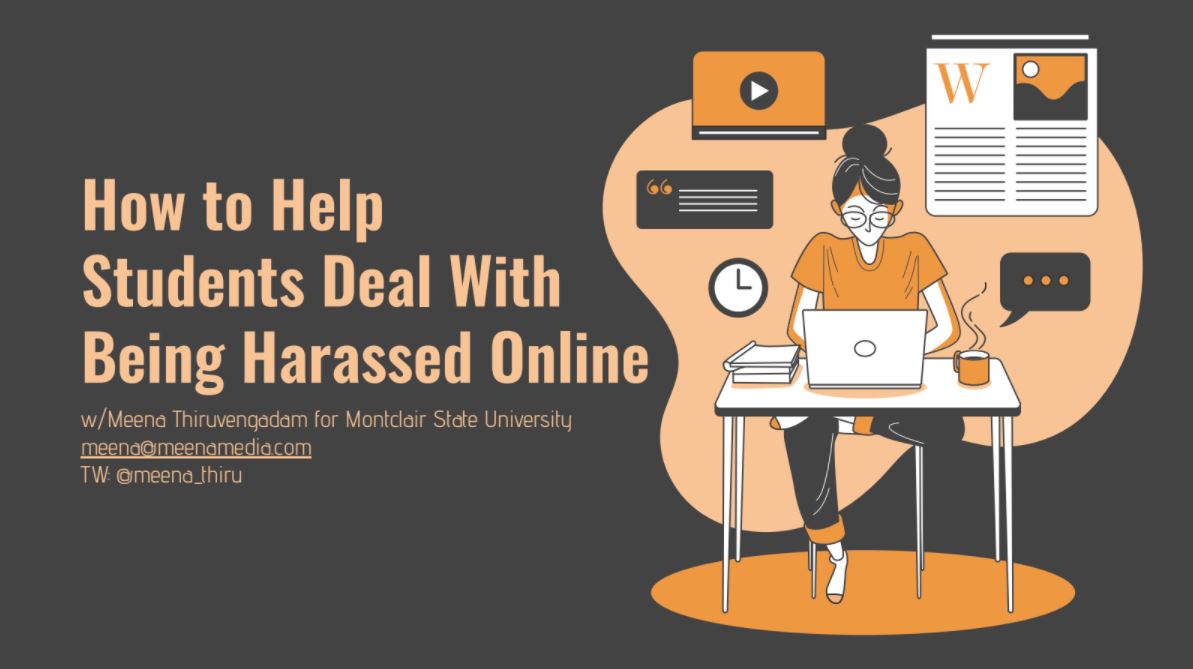Having an online presence nowadays means everything. We can show our true selves, interact with people from all over the world and vent about any topic.
Social media platforms – such as Twitter and Instagram – have come to dominate our free time, giving us a sneak peek into the lives of others. But what happens when we face online harassment? How do we deal with intimidating threats, shameful name-calling and premeditated comments made to make us feel bad about ourselves?
Last Thursday, Feb. 18, Meena Thiruvengadam, a renowned journalist with hands-on experience leading newsrooms, partnered with The New Jersey College News Commons Team in giving an informative presentation for both professors and students. The presentation focused on how to handle online harassment, given the alarming rise in this threatening behavior within the last five years.
“Nowadays, you have more Americans than ever who have experienced some type of online harassment, and those more severe encounters – those ones that we really need to be alarmed about and teach students to watch out for – those are the ones that are becoming more common,” Thiruvengadam said.
Before we can begin to discuss online harassment, we must first understand what it is.
According to Thiruvengadam, online harassment can be defined as “the repeated or severe targeting – online – of an individual or group through harmful behaviors, including hateful speech, sexual harassment, threats of physical and sexual violence, impersonation, sharing nonconsensual photography and message bombing.”
When someone pretends to be another person online, posts personal information – like phone numbers and home addresses – or hacks someone’s email or social media, harassment is already taking place.
“Students may not easily recognize online harassment when they experience it. And when they do see it, they might not know when to take it seriously,” Thiruvengadam said. “I do some writing, still, and I get comments from people that are rude and annoying, but never anything really worrisome. That’s one of the ways that you must help your students differentiate between – when is it just a person being a jerk versus something where I need to take steps to protect myself?”
One specific group that faces harassment online is women. It doesn’t matter what type of journalistic work is produced; the attacks are directed at women strictly because of their gender.
According to Thiruvengadam’s presentation, 73% of female journalists have reported experiencing online violence in the course of their work, 25% of female journalists have reported receiving threats of physical violence and 20% of women reported attacks that moved from online to offline.
Harassment comes in different forms – some that we may not know about – such as technical attacks, doxing, impersonation, threats, exclusion and, the most common, trolling. Whether a person hacks the account of another, posts personal or private information online, purposefully excludes others from public social media forums or posts comments to create conflict, they are still taking part in one of society’s greatest issues – online harassment.
There are various actions that you can take in dealing with online harassment. A few that Thiruvengadam suggested are making sure to lock up all of your personal information and accounts, block, mute and report harassment to social media platforms and ignore and delete any harassing messages.
She also encouraged individuals to document abuse, make police reports, encourage self-care and ask for help. If you are dealing with online harassment, taking any of these steps will help you fix the situation and begin to put an end to the abuse.
“There are not a lot of people who are going to harp on something and not forget about it,” Thiruvengadam said. “But on the flip side, that person who is going to continually harp on something – and not forget about it – could be the most dangerous one of all. And that’s why you have to help people navigate this.”
For comments/questions about this story, email [email protected] or tweet @TheWhitOnline.

























































































































































!["Working with [Dr. Lynch] is always a learning experience for me. She is a treasure,” said Thomas. - Staff Writer / Kacie Scibilia](https://thewhitonline.com/wp-content/uploads/2025/04/choir-1-1200x694.jpg)









































